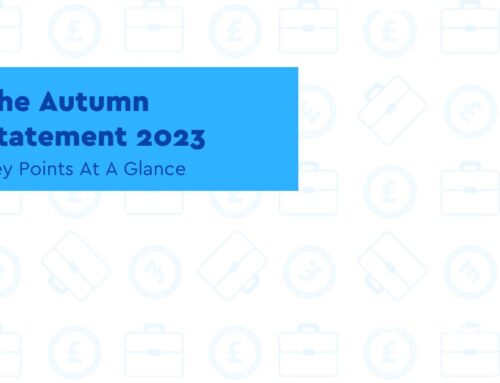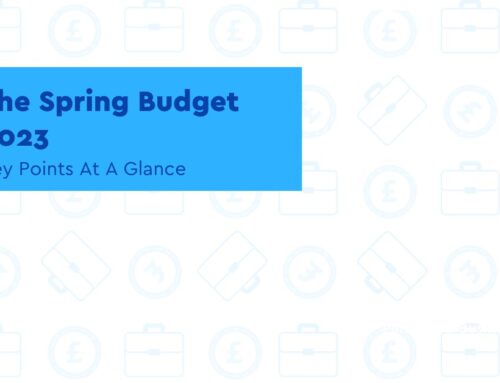Budget – Personal Tax
Mini-Budget 2022 – Personal Tax announcements
Key Points
- The 1.25% rise in National Insurance will be reversed from November
- The plan to scrap the top rate of income tax has this week also been reversed
- A permanent cut to stamp duty land tax will be effective immediately from September 23
The 1.25% rise in National Insurance will be reversed from 6 November and the government will axe a planned tax rise to fund health and social care.
The NI rise was introduced in April under former chancellor Rishi Sunak, but during the leadership race, Liz Truss pledged to change it.
New chancellor Kwasi Kwarteng said the government would also cancel a separate tax, the Health and Social Care Levy, which was due to come into force in April 2023 and scrap a planned increase to dividend tax rates.
Employees earning between £1,048.01 and £4,189 a month will see their NICs reduce from 13.25% to 12% from November, while earnings above £4,189 will revert to from 3.25% to 2%.
The cancellation will save 28 million taxpayers an average of £330 a year, according to the Treasury. The NICs primary threshold and lower profits limit will remain at £12,570.
Income Tax
The government on Monday reversed a plan to scrap the top rate of income tax, after a public backlash and major market turbulence.
The plan to scrap the 45p rate, paid by people earning more than £150,000 a year, was announced as part of a package of tax cuts.
“It is clear that the abolition of the 45p tax rate has become a distraction from our overriding mission to tackle the challenges facing our economy,” Kwarteng said in a statement.
“As a result, I’m announcing we are not proceeding with the abolition of the 45p tax rate. We get it, and we have listened.”
Dividends
From April 6, 2023, the Government is also reversing the recently implemented 1.25 percentage point increase in dividend tax rates, applied UK wide. The basic and higher rates of dividend tax will be reduced to the 2021/22 levels of 7.5% and 32.5% respectively.
Stamp Duty
The Government announced a permanent cut to stamp duty land tax (SDLT), effective immediately from 23 September 2022.
The limit has been doubled to £250,000 – and £425,000 for first-time buyers – in an attempt, said Kwarteng, to help families aspiring to own their own homes and boost economic growth by stimulating the property market.
Over 200,000 people will now be exempt from paying the tax, the Government estimates, and first-time buyers will now benefit from discounted stamp duty on properties costing up to £625,000 – up from £500,000.
Universal credit
Kwarteng also announced the administrative earnings threshold (AET) will increase to 15 hours a week at the national living wage from January 2023 for universal credit (UC) claimants.
The policy will push around 120,000 claimants from the ‘light touch’ regime to the ‘intensive work search’ regime, under which they will be expected to secure more or better paid work or accept a reduction in their benefits payments.
Claimants will also have to abide by clearer work expectations, including applying for jobs, attending interviews or increasing hours to receive UC.
Budget – Business Tax
Mini-Budget 2022 – Business Tax announcements
Key Points
- Corporation tax increase to 25% on company profits over £250,000 cancelled
- Up to 38 local authorities across the UK may soon have investment zones within them
- The temporary cap of £1m for the annual investment allowance will be permanent
Previously, corporation tax was due to increase to 25% next year for company profits over £250,000, while the tax on profits between £50,000 and £250,000 would remain at 19%.
But during the speech, Kwarteng confirmed that the increase would be cancelled. This means that the UK’s corporation tax rate will remain at 19% for all UK companies, which the Government claims will bring almost £19 billion a year back into the economy.
Martin McTague, national chair of the Federation of Small Businesses (FSB), said:
“It’s good that the planned corporation tax increase has been scrapped. The £50,000 threshold for the main rate would have captured many small firms, so keeping tax on profits over £50,000 at 19% is welcome.
IR35 rules repealed
Reforms to the off-payroll working rules, known as IR35, are to be scrapped from April 2023, the Treasury has announced.
This will mean that from 6 April 2023, contractors working for an organisation via an intermediary will once again be responsible for determining their employment status and paying the appropriate amount of tax and national insurance contributions.
Low-tax investment zones
Up to 38 local authorities across the UK may soon have investment zones within them.
Startup businesses willing to have their premises within these zones, or to co-locate there, can receive some extremely generous tax cuts, as follows:
- 100% relief on business rates on newly occupied or expanded business premises.
- 100% enhanced capital allowance relief for plans and machinery for the first year.
- Zero-rate Class 1 employer NICs on salaries for new employees who are paid up to £50,270.
- No stamp duty on land bought for commercial or residential development.
- Enhanced Structures and Buildings Allowance relief of 20% per year.
It’s worth mentioning that the above applies only to activities within the zone.
In other words, if you have a second business premises elsewhere, you can’t apply zero-rate NICs relief to employees working there.
Nor can you buy plant and machinery for use outside the zone and claim the enhanced capital relief allowance (although the Annual Investment Allowance could apply—see above).
Capital investment
To further support and develop businesses, the Chancellor said the Government will make the temporary cap of £1m for the annual investment allowance (AIA) permanent.
Originally expected to expire on 31 March 2023 and return to its previous level of £200,000, the allowance allows businesses to invest in plant and machinery assets worth up to £1m. This means that businesses will be able to reclaim 100% of qualifying costs in the year of purchase.
Company Share Option Plan (CSOP)
From April 2023, businesses using CSOP will be able to issue up to £60,000 of tax-advantaged share options to employees.
This is double the current £30,000 limit.
Budget – Energy Support
Mini-Budget 2022 – Energy Support
Key Points
- The Energy Price Guarantee for households will limit the unit price on the electricity and gas bills of domestic customers
- The Energy Bill Release Scheme will cap wholesale energy prices for six months from October 1 for all organisations
- The Energy Markets Financing Scheme will offer emergency liquidity for failing energy companies
- The measures, the chancellor insisted, will help bring down inflation by around five percentage points.
One of other areas of focus was to elaborate on the Government’s relief package to help businesses and households tackle the catastrophic rise in energy prices. Kwarteng announced three key measures.
First, he discussed the previously announced Energy Price Guarantee for households. The scheme will limit the unit price on the electricity and gas bills of domestic customers.
Kwarteng said this means that, over the next two years, a typical household bill will be £2,500. This, he said, will cut everyone’s energy bills by an average of £1,400.
The Government will also offer a one-off £400 fuel bill discount to all households this winter, and anyone who doesn’t use mains gas and electricity – like those using heating oil – will receive an additional £100 on top. The ‘most vulnerable’ will be offered additional support, with a total saving of up to £2,200.
He also said businesses will benefit from the government’s ‘Energy Bill Release Scheme’, which will act in a similar way to the guarantee for households. It will cap wholesale energy prices for six months from October 1 for all organisations. It will apply to all non-domestic energy customers in England, Scotland and Wales.
If you entered into a fixed price contract that started after 1 April 2022, you’ll still be eligible for the scheme, and anyone on a variable energy tariff will receive an automatic discount for each unit of energy used.
In three months’ time, a review identifying organisations that need further support after March 2023 will be published. As with the energy price guarantee for households, customers do not need to take action or apply to the scheme to access the support.
Finally, the £40bn ‘Energy Markets Financing Scheme’ – which will be delivered with Bank of England – will offer emergency liquidity for failing energy companies.
The scheme will provide liquidity to firms through a 100% guarantee, delivered via commercial banks and will open to applications from 17 October.
The measures, the chancellor insisted, will help bring down inflation by around five percentage points.
Truss also announced earlier in September that green levies would be removed from domestic energy bills for two years, saving the average household £150.
Budget – Other Announcements
Mini-Budget 2022 – Other Announcements
Key Points
- EIS, SEIS and VCT schemes will be renewed beyond their 2025 deadlines
- The government will scrap the planned alcohol duty increase for wine, beer and spirits
- The government has confirmed it will bring forward draft regulations to reform the pensions regulatory charge cap
VCT schemes extended
Both the Enterprise and Seed Enterprise Investment Schemes (EIS and SEIS) and VCT schemes will be renewed beyond their 2025 deadlines, in a bid to boost UK entrepreneurship.
Alongside this, the chancellor said the limits on the Seed Enterprise Investment Scheme and Company Share Option Plans would be increased to “make them more generous”.
The SEIS scheme allows startups and entrepreneurs to source early stage funding and will get a bump as of April 2023.
Companies will be able to raise up to £250,000 of SEIS investment, and the gross asset limit is increased to £350,000 (and the age limit raised to three years).
The annual investor limit is doubled to £200,000.
VAT-free shopping for tourists
The introduction of a “digital, VAT-free shopping scheme” for non-UK visitors will see VAT on high street and airport purchases refunded via an easy-to-use scheme that no longer relies on paper-based forms.
There are no dates around this measure and a consultation will commence soon.
Alcohol Duty
The government will scrap the planned alcohol duty increase for wine, beer and spirits. The Government will freeze duty rates for all categories from February 1, 2023. Any reforms to the system will be implemented on August 1, 2023 following a consultation.
DC charge cap regs brought forward
The government has confirmed it will bring forward draft regulations to reform the pensions regulatory charge cap.
Kwarteng announced the government will bring forward draft regulations to give defined contribution pension schemes the “clarity and flexibility” to invest in the UK’s innovative businesses and productive assets creating opportunities to deliver higher returns for savers.
This comes after the government in its Autumn Budget last year confirmed it would review the DC charge cap, launching another consultation in order to direct cash into the levelling-up agenda.
News – Business
Business Updates
Key Points
- Supporting UK businesses to trade: TFG partners with UKEF and DIT to create a trade and export finance guide
- Business mileage rates cannot exceed 45p
Supporting UK businesses to trade: TFG partners with UKEF and DIT to create a trade and export finance guide
The 60-page guide comes against a backdrop of complex geopolitical circumstances and an ever-changing financial landscape.
Exploring recent issues, such as the COVID-19 pandemic, Brexit, and the current Russia-Ukraine conflict, this guide aims to paint a clearer picture of how to navigate the current economic status of the industry.
Tim Reid, director of business group at UK Export Finance, says:
“Exports can help businesses increase profits and grow, especially when you are supplying to industries that are growing faster outside of the UK.
“That’s why we are pleased to be working with Trade Finance Global to help business leaders understand the benefits of trade and how the right finance can unlock new opportunities.
“As the UK’s national export credit agency, we can help businesses tap into global markets by making export finance and insurance more accessible.”
This latest guide begins with a brief definition of trade finance, as well as its advantages in financing a company’s future development.
Next, the guide provides an insight into the trade cycle, along with the nuances of undertaking or expanding international trade ventures in the context of the financing gap.
The guide also provides UK exporters with detailed information regarding UKEF’s trade finance and insurance products for a more complete picture of the sector.
Elsewhere, the guide distinguishes between funded and unfunded trade finance, ensuring a thorough summary of underlying dynamics in buyer-seller relationships.
Transacting across borders can be a complicated affair, as such, the trade and export finance guide examines pre-shipment, post-shipment, and supply chain finance giving an overview of associated risks.
Examples of how this all comes together is shown through two UK case studies; First Subsea, a designer and manufacturer of cable protection systems for offshore wind farms, and Union Papertech, a British tea and coffee supplier.
The guide is freely available to download now at www.tradefinanceglobal.com/export-finance
Business mileage rates cannot exceed 45p
Following some confusion over the tax status of business mileage rates, the government has confirmed that tax-free payments are capped at 45p per mile
The government has clarified that under the approved mileage allowance payment (AMAP), businesses cannot reimburse costs over the 45p rate regardless of the price of fuel. Any rates paid over the benchmark will be liable for income tax and National Insurance contributions (NICs).
In a written statement, Alan Mak, Exchequer secretary to the Treasury, said: ‘The government has become aware of a technical inaccuracy in its responses to a number of parliamentary questions, correspondence and a parliamentary e-petition response on the subject of approved mileage allowance payments (AMAP) from March to August 2022.
‘The response stated that actual expenditure in relation to business mileage could be reimbursed free of income tax and National Insurance contributions. This is in fact only possible for volunteer drivers. Where an employer reimburses more than the AMAP rate, income tax and National Insurance are due on the difference. The AMAP rate exists to reduce the administrative burden on employers.
Latest Snippets
Does income tax U-turn mean
interest rates won’t rise to 6%?
Markets are no longer pricing in 6% interest rates by next year as the government scrapped the abolition of the 45p top tax rate.
Traders are now predicting interest rates to hit between 5.5% and 5.75% by next year.
The current Bank of England base interest rate sits at 2.25%, after it was increased in September. This rate affects how much banks charge for borrowing including mortgages, loans and credit cards.
Bank governor Andrew Bailey said the Monetary Policy Committee, which sets rates, would assess the impact on inflation and the fall in sterling at its next meeting in November, and then “act accordingly”.
The Bank of England was forced to step in to prevent the bond market from entering a downward spiral.
The BoE’s £65bn intervention in the bond market on Wednesday followed warnings of cash calls in the pensions market that could potentially spark mass insolvencies.
Treasury rejects call for early OBR forecast
The prime minister and chancellor have rejected calls for the early publication of the Office for Budget Responsibility’s forecast, instead confirming it will be published on November 23 as planned.
Liz Truss and Kwasi Kwarteng met with the OBR last Friday morning to discuss market volatility in the wake of the mini-budget, and was seen as the latest effort on the government’s part to reassure the markets.
“The forecast will, as always, be based on our independent judgement about economic and fiscal prospects, and the impact of the government’s policies,” the OBR said in a statement.
However the Treasury rejected the call for an early publication of the budget watchdog’s fiscal forecast, and in a statement said an “economic and fiscal forecast” will be published on November 23.
The chancellor is now facing calls to bring forward his planned statement setting out how he intends to get the public finances back on track.
Mr Kwarteng said he would deliver his medium-term fiscal plan explaining how he would get debt falling as a percentage of GDP, alongside the updated OBR forecasts, on November 23.
Get In Touch
At Morgan Reach, we understand every business needs a little help now and again-especially when it comes to the financial side of things. Therefore, to help our clients and visitors we endeavour to cover as much of the business news as possible. If you are self-employed or run a business and need assistance and advice on how these news could make a difference to you or your business, feel free to get in touch with the experts at Morgan Reach. Our business growth experts at Morgan Reach will guide you through what support is available for you or your business as well as the latest news that may affect you.







